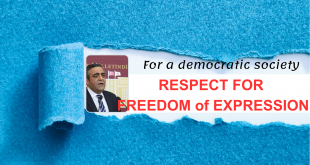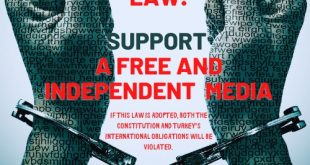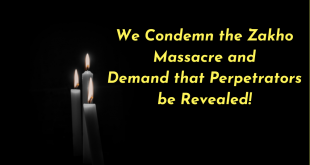In the year 2000, 11 F-type prisons were opened introducing cell system. The protests and hunger strikes resisting these prisons were started in October 2000 with around 1000 inmates and ended on 19 December 2000 when pressed down after a bloody operation during the transfer of the detainees and convicts to F-type prisons. 30 inmates and 2 security officers lost their lives in the operation. Following the events, both international and local human rights organisations and other non-governmental organisations made statements blaming the type of transfer and loss of life and drew attention to the human rights violations.
In the past six years, the conditions of isolation in F-type prisons were put on the agenda by several non-governmental organisations and the public authorities were warned. All the human rights organisations declared several times that the isolation of the prisoners in small groups or individually for a long time and to prevent them from coming together with other inmates deteriorate their physical and psychological integrity, and since such a practice alone was cruel, inhuman and degrading, it could be regarded as a kind of torture.
Article 3 of the European Convention on Human Rights, and the UN Convention against Torture and other Cruel, Inhuman or Degrading Treatment or Punishment, to which Turkey is a contracting party, prohibit torture, and the states must prevent torture. Turkey also ratified the Convention on the Prevention of Torture, Inhuman, Degrading Punishment or Treatment and allowed a Committee for the Prevention of Torture to be set up under this convention to inspect the prisons, and it welcomes the opinion reports of the Committee they draw up at the end of inspection.
Since 2000, in its reports on Turkey, the Committee for the Prevention of Torture has put emphasis on the issue of allowing the inmates to come together with other inmates. The Committee’s reports released on 7 December 2000, 8 November 2001, 19 March 2002, 8 December 2005, and 8 September 2006 contained detailed observations regarding this issue. The Committee stressed in its latest report that the out of cell activities in F-type prisons were so limited. Stating that F-type prisons were a failure to solve the problem of small group isolation, the report revealed, based on the observations in Adana F-Type Prison and Tekirdağ F-Type Prisons Nos. 1 and 2, that in F-type prisons even the practice of giving 5 hours for 10 prisoners to spend time together in a week, an administrative practice that is not sufficient, was not seen. The inmates were given 5-6 hours a month to spend time together with other inmates. For this, groups consisting of 9 people were formed and each group was given one hour. The prison management could not find cordial, constructive and positive solutions, as read from the same report. The Committee recommended that urgent measures should be taken to give more time to the inmates in F-type prisons to spend time together with other inmates.
The Ministry of Justice disregards the concerns of the non-governmental organisations and the Committee for the Prevention of Torture about the isolation conditions in F-type prisons, an issue that has been on the agenda for six years. Recently, mainly the Minister of Justice, and also the officials of the Ministry refused all efforts for discussion and dialogue regarding this issue. All these imply that the situation in F-type prisons will remain the same – the inmates will not be given additional hours to spend time together – and that the recommendations of non-governmental or governmental authorities will be ignored.
We, as the member organisations of the Joint Platform for Human Rights (JPHR), are concerned about humanitarian and social results in the upcoming period if the government continues to be silent on this issue. We hope our recommendations we give below will receive urgent attention to prevent any trauma and heavier results that may occur on both the prisoners and their relatives as a consequence of the death fast of the Behiç Aşçı, lawyer, Sevgi Saymaz, a detainee, and her convicted mother Gülcan Gözoğlu:
1- The Ministry of Justice should take urgent action to improve the situation of the inmates regarding the time they spend together with other inmates. When doing this, the recommendation of the non-governmental organisations should be regarded as one of the minimum humanitarian criteria which will remove isolation of the inmates. The recommendation was the “opening of 3 doors” to allow 9 inmates to come together. This can be achieved by opening the cells that are adjacent to each other during daytime.
2- The Ministry of Justice should make a solemn commitment to resolve the problem as regards the situation in F-type prisons,
– what the social activities are,
– how long the inmates take part in social activities in a week,
– what the total number of the prisoners who take part in social activities and the rate of participation according to the type of social activity (spending time together, use of library, family visits, making phone calls, working at workshops) are, and
– what the total number of inmates who are allowed to spend time together is.
3- The Ministry of Justice should take measures to follow a standard procedure for the prisoners in all F-type prisons and remove different practices in different prisons.
4- The Ministry of Justice should take measures to create a continuous dialogue environment with non-governmental organisations and human rights organisations, and should not disregard the recommendations of the non-governmental organisations.
5- The Ministry of Justice should take urgent action as regards the measures allowing the prisoners to spend time together for longer periods, an issue repeatedly stated by the Committee for the Prevention of Torture and highlighted in its last report. The Ministry should give comfort on this issue both the non-governmental organisations and the governmental institutions concerned.
6- All the detainees and convicts should receive humanly treatment, and any act that may lead to torture and ill treatment should be prevented.
 HRJP Human Rights Joint Platform
HRJP Human Rights Joint Platform



